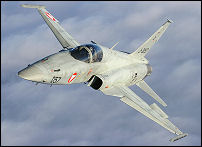 Marc Knapp, a 36 year old California man, was arrested on charges that, among other things, he attempted to export a military surplus F-5 fighter jet and other export-controlled defense articles. to Iran. The recently unsealed criminal complaint alleges a number of interesting details including a new entry in the Futile Justifications Hall of Fame.
Marc Knapp, a 36 year old California man, was arrested on charges that, among other things, he attempted to export a military surplus F-5 fighter jet and other export-controlled defense articles. to Iran. The recently unsealed criminal complaint alleges a number of interesting details including a new entry in the Futile Justifications Hall of Fame.
The complaint alleges that Knapp and an undercover agent discussed in great detail the plans to export the F-5. The aircraft, which was stored at an airport in Van Nuys, California, would be flown to Delaware where it would be crated, then shipped to Hungary for transshipment to Iran. During these conversations, a remarkable interchange allegedly occurred:
UCA1 [the undercover agent] then informed KNAPP that Iran was trying to obtain F-4 and F-14 fighter jets and accompanying items, and that so long as KNAPP did not care about the end destination, they could make some money. KNAPP stated that he was able to “compartmentalize,” and that the United States would “shoot down” anything (referring to aircraft, etc.) provided to Iran.
In Knapp’s view, apparently, it was okay to sell fighter jets and other defense items to Iran as long as they were pieces of junk that the U.S. could easily shoot out of the sky. Calling this a futile justification probably involves stretching the meaning of justification beyond the breaking point.
As jaw dropping as Knapp’s “justification” was, the story gets worse. Knapp’s defense attorney has apparently decided that Knapp is his best resource on export law rather than, say, the International Traffic in Arms Regulations (“ITAR”) or the court cases involving the Arm Export Control Act set out in the Annotated United States Code. There is no other reasonable explanation than that for this:
The F-5 Tiger was sold as surplus years ago to a California man who rented it to movie studios. … Knapp’s lawyer … said it would have done the Iranians no good to buy it.
“If the plane were used against the U.S., it would likely be shot down in minutes or seconds,” he said.
I went back and checked the ITAR and was unable to find an exemption for ineffective defense articles.
 In a previous post on the prosecution of Mark Knapp for his efforts to export a military surplus F-5 fighter jet to Iran, I criticized the apparent defense offered by Knapp’s attorney — that the F-5 could be shot down by U.S. fighter jets. Well, apparently Knapp and his attorney have come to their senses, and Knapp has now pleaded guilty to the charge relating to the fighter jet and other defense items that Knapp was attempting to export, including an ejection seat and a military radio.
In a previous post on the prosecution of Mark Knapp for his efforts to export a military surplus F-5 fighter jet to Iran, I criticized the apparent defense offered by Knapp’s attorney — that the F-5 could be shot down by U.S. fighter jets. Well, apparently Knapp and his attorney have come to their senses, and Knapp has now pleaded guilty to the charge relating to the fighter jet and other defense items that Knapp was attempting to export, including an ejection seat and a military radio.
 Posted by
Posted by  Category:
Category: 


 A recently unsealed
A recently unsealed 

